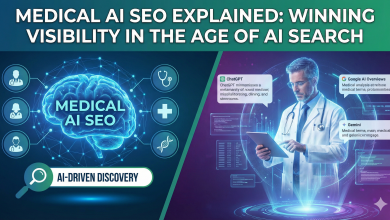1. The Molecules Don’t Care About Your Deadlines
Nature doesn’t run on quarterly targets. Molecules twist and writhe in three-dimensional hellscapes—somewhere between predictable and feral. Classical computers try to tame them with binary logic and approximations that would insult any self-respecting electron. And yet, this is how we’ve designed drugs, fuels, and industrial materials for decades—on guesswork and brute-force modelling.
https://quantumai.co offers a different approach. Not faster. Not easier. Just more honest about the chaos. It combines the raw theoretical power of quantum simulation—where particles can be modelled in their true quantum states—with machine learning’s ability to spot patterns no human eye could catch.
It doesn’t promise miracles. But it does promise less lying to ourselves. It means simulating a protein binding event without reducing it to a cartoon. It means exploring materials at the atomic level—where things really happen.
Still, most of it’s locked behind labs and proprietary patents. Which is to say: the science is ahead of the business model, and that’s always a dangerous place to be.
2. Drug Discovery: From Lab Rats to Quantum Circuits
The pharmaceutical industry’s R&D pipeline is a clogged artery. The cost of bringing a drug to market can hit $2 billion, and most don’t make it past clinical trials. That’s not inefficiency—it’s fundamental uncertainty. Biology is messy. Chemistry is worse.
Quantum AI doesn’t erase this mess. But it cuts deeper. Imagine modelling molecular interactions without dumbing them down. Not as static diagrams, but as entangled systems where spin, charge, and vibration all matter. That’s where quantum computing steps in—mapping the dance of atoms with unsettling precision.
The AI part? That’s your interpreter. It sifts through simulation data, finds the promising leads, suggests pathways the human mind wouldn’t bother entertaining. Companies like QC Ware and BenevolentAI are circling the edges of this field. Slowly. Quietly. Because if it works, the implications go beyond drugs—it changes how we understand molecular life itself.
For now, it’s mostly theoretical. But the writing’s on the circuit board: classical drug discovery is a half-lit room, and https://quantumai.co may be the one flicking on the overhead.
3. Quantum AI Trading: High Finance in Superposition
The markets are chaos in a tie. Price signals, derivatives, inflation metrics—piled high and modelled as if they make sense. In truth, they don’t. Not really. They move on fear, rumour, latency, and the peculiar madness of crowds.
Quantum AI doesn’t fix this—it leans into it. Quantum systems can handle complex probability distributions with grace. Pair that with machine learning tuned to sniff out anomalies in multidimensional data and suddenly your hedge fund isn’t just guessing—it’s hedging in the fourth dimension.
Projects like Multiverse Computing are already feeding quantum-enhanced algorithms into portfolios. They claim better pattern detection, faster arbitrage, sharper risk assessment. They’re probably right. But they’re also trading on novelty—hoping to be first, not necessarily best.
What’s clear is this: the tools are shifting. Finance has always been a race to exploit inefficiency. Quantum AI just promises to find it faster—before anyone else knows it’s there.
4. Materials Science: Engineering in the Quantum Wild
Designing new materials used to mean melting, mixing, and hoping. Even now, it’s a process of simulations, lab tests, and more hoping. Because classical modelling breaks down at the nanoscale. Electrons don’t behave. Bonds shift. Structures collapse.
Enter Quantum AI—not as a saviour, but as a better microscope. It lets researchers model materials at the quantum level, predicting properties like conductivity, strength, or reactivity before anything is synthesised.
The potential here is vast. Think batteries that don’t catch fire. Solar panels that actually pay for themselves. Catalysts that don’t rely on rare earths hoarded by governments. Organisations like Google’s Quantum AI division and Zapata AI are already eyeing this space—not for charity, but because materials are the scaffolding of every other industry.
The reality? It’s a grind. Quantum hardware is unstable. Algorithms are still experimental. But if you’re building the future, it helps to work with tools that speak the same language as atoms.
5. What’s in the Way: Hardware, Hype, and Human Shortsightedness
Quantum AI lives on the razor’s edge of ambition and constraint. Qubits are noisy. Decoherence is the devil. Most “quantum advantage” claims are walking a fine line between aspiration and fiction.
And yet the field marches on—because classical tools are running out of rope. The problems we face—drug resistance, energy storage, climate modelling—aren’t linear or polite. They’re entangled, multi-dimensional, and uncooperative.
Quantum AI doesn’t need to be perfect. It just needs to be better at seeing the shape of complexity. And that’s what it’s good at—when it works.
The challenge? Scaling it. Commercialising it. Keeping the VC suits from turning it into another blockchain sideshow. But under the noise, the science is real. The potential is raw and ugly and difficult—but it’s there.
FAQ: Cutting Through the Quantum Static
Is Quantum AI real or just a buzzword?
Real. But early. Quantum computing is still in development, and integrating it with AI is an ongoing experiment. The term covers a spectrum of efforts—from using quantum computers to run machine learning tasks, to designing AI tools that help optimise quantum systems.
Why is Quantum AI important for drug discovery?
Because simulating molecules accurately on classical machines is nearly impossible. Quantum systems can model molecular interactions more naturally. Combined with AI, they can speed up the discovery of promising compounds and reduce failure rates in trials.
Can Quantum AI already design new materials?
Not autonomously, and not at scale. But it can help simulate the behaviour of materials at the atomic level—predicting properties before anything is physically created. That’s a major leap forward.
Will Quantum AI give hedge funds an unfair advantage?
If they build it first, yes. This isn’t about fairness. It’s about computation. Quantum AI can analyse complex, non-linear financial data in ways that classical systems struggle to match.
Where can I learn more?
Start with https://quantumai.co—it won’t promise utopia, just a clearer picture of what’s real, what’s next, and what might actually matter.





